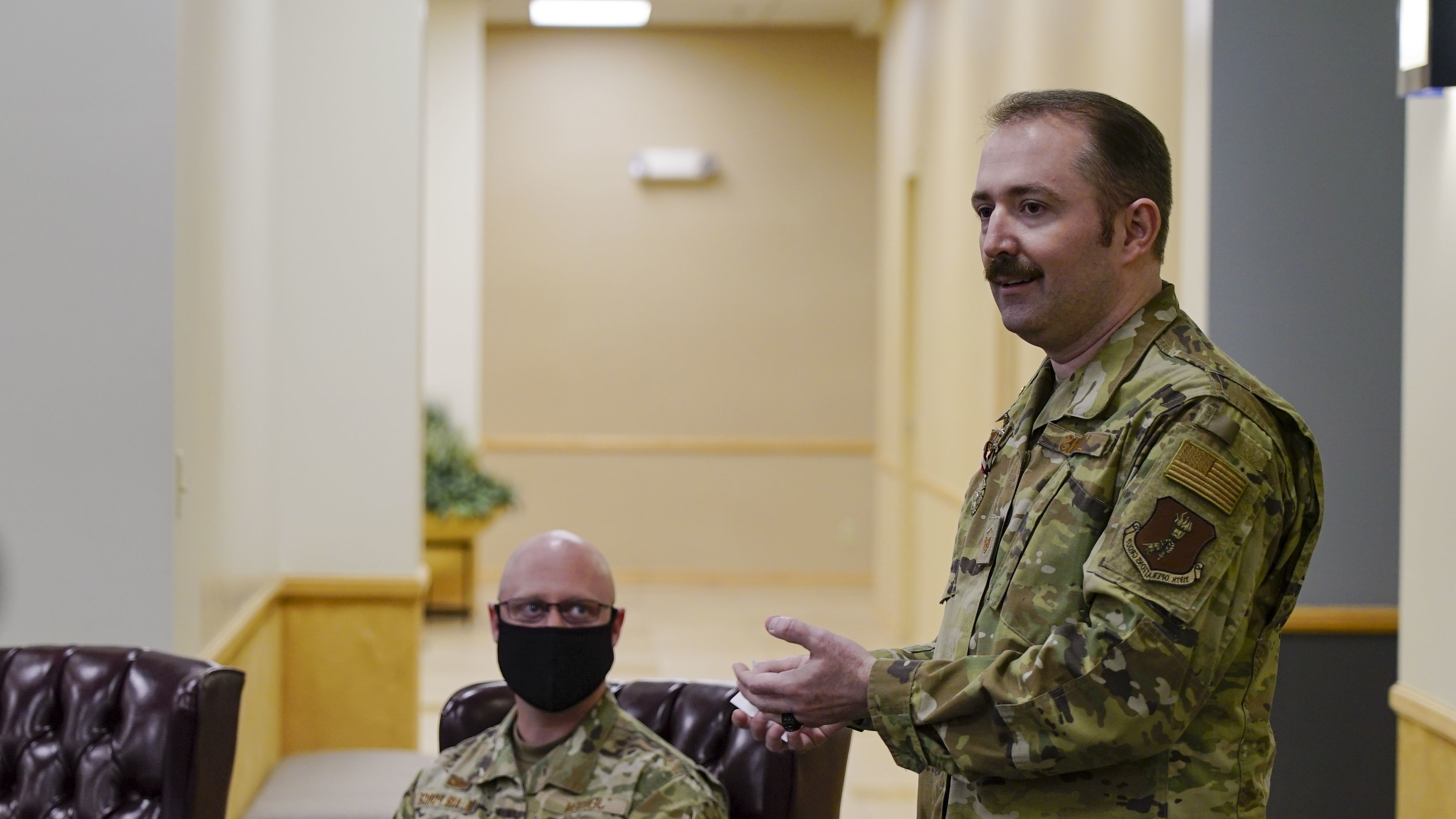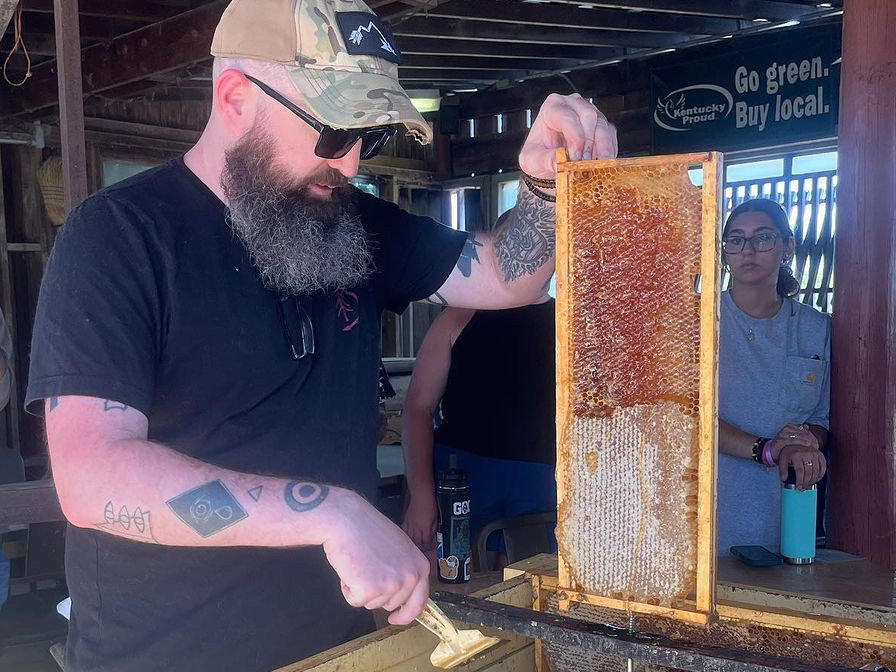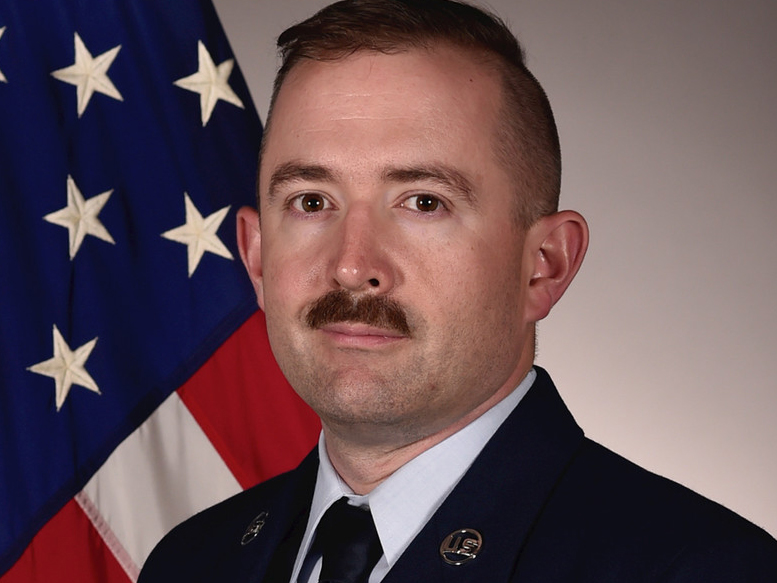Air Force veteran, first-generation student pursues dream of helping local community’s food access
Air Force veteran, first-generation student pursues dream of helping local community’s food access

Since retiring from the United States Air Force as a master sergeant (MSgt) two and a half years ago, Bradley Lykins made the decision to rekindle his connection with nature and his farming roots by enrolling at the University of Kentucky Martin-Gatton College of Agriculture, Food and Environment, majoring in sustainable agriculture and community food networks with a minor in plant and soil sciences.
A non-traditional, first-generation college student, Lykins grew up among the fragrant green and amber fields of America’s tobacco belt. Money was tight, so at age 17, Lykins joined the Air Force after graduating from Garrard County High School.
Lykins enlisted in June 2001, less than three months before the terrorist attacks in New York and Washington, D.C. He was subsequently deployed five times: twice to Afghanistan in 2002, to Iraq in 2003 and 2004 and the United Arab Emirates in 2006 to support Operation Iraqi Freedom.
The anticipated six years turned into two decades. Lykins’ Air Force career spanned military sciences and technology, aviation technology and education. His last role was as chief quality assurance inspector for the Air Force’s fleet of RQ-4 Global Hawk autonomous surveillance aircraft. Lykins is now utilizing his military benefits to embark on a new life direction.
Through the support of the government’s Post-9/11 GI Bill, Lykins is following his passion for farming, returning to the classroom and actively gaining hands-on experience in modern agricultural techniques. Lykins aims to merge his Air Force experience and newfound knowledge to enrich lives in his community.
“Much of my background is in life cycle logistics,” Lykins said. “I can now combine those skills with what I’m learning here at UK into a way to have a local food distribution specifically for the Lower Bluegrass area of Boyle, Garrard, Lincoln, Madison and Mercer Counties. Those are traditionally poorer areas in the state where access to food remains a huge concern. It isn’t access to calories but access to nutrition. Being able to set up some type of nonprofit that can help offset that nutrition deficit in the area—that’s the dream.”
Many of the tobacco fields of Lykins’ youth have since transitioned to more sustainable crops, and he seeks to actively contribute to the movement aimed at safeguarding the environment.
According to Lykins, one of the most captivating aspects he has discovered revolves around the university’s organic farm.
Describing it as “amazing,” Lykins says the scope and scale of the farm has transformed his perceptions of what it means to be truly organic.

“Without this type of formal education, I don’t think I would’ve ever had the opportunity to be a part of something like this,” Lykins explains. “The hands-on portion—the practical portion of the learning—is just…it’s incredible. You can read about it and write research papers on it and do all that, but until you put your hands in the dirt and really apply it, that makes all the difference in the world.”
In addition to his studies, Lykins has mentored students in the UK ROTC program, believing that this engagement and contribution aids in combating the loss of identity that many military personnel grapple with upon reentering civilian life.
Lykins is well aware of the considerable number of veterans and active military students who choose to study at UK.
In the 2022-23 academic year, UK had an enrollment of nearly 700 undergraduate and graduate students who were either actively serving or had prior experience in the armed forces. Of these, more than 88 percent receive some educational benefit from the Veteran’s Administration.
Lykins says he knows how fortunate he is to have the Post-9/11 GI Bill (Chapter 33) to fund his studies and that he does not take it lightly.
“I find myself treating school the same way I treated it while I was in the military,” Lykins explains. “It’s my job. I technically get paid to go to school and they cover my tuition. I know a lot of students don’t have the same opportunity. If I wasn’t taking it seriously, I’d feel as if I’m wasting it. I look at it as if this is my job and I want to do it well.”

As Veterans Day approaches, Lykins says that he does not necessarily consider himself a figure to celebrate.
“I know I’m a veteran; I just don’t necessarily think of myself as a veteran. I’m just Brad. I’ve been around a lot of veterans and I’m very thankful to all those individuals. I’m thankful to all my friends who are still serving and who have served. I’m very proud.”
Lykins hopes that the public will consider contributing to one of UK’s scholarships for veterans, showing their appreciation for those who serve. Despite the generous financial aid many military families receive to attend college, others are still left with the burden of tuition that is often difficult to meet.
“There’s a good majority of the military, either ROTC or enlisted, who don’t come from the best socioeconomic backgrounds,” Lykins explains. “There’s a lot of instability, and it’s one of those things that you feel defines you throughout your life. By being able to give to an organization that can support them, what you’re doing is setting them up for a lifetime.”
Lykins has another two years to complete his agricultural coursework at the University of Kentucky. For Lykins, this will be a proud moment.
“Once I saw that the programs UK had really lined up with what I wanted to do, it was a no-brainer,” Lykins enthuses. “I’ll get to call myself a UK grad. Being from Kentucky that means a lot to me.”
– 30 –
The Martin-Gatton College of Agriculture, Food and Environment is an Equal Opportunity Organization with respect to education and employment and authorization to provide research, education information and other services only to individuals and institutions that function without regard to economic or social status and will not discriminate on the basis of race, color, ethnic origin, national origin, creed, religion, political belief, sex, sexual orientation, gender identity, gender expression, pregnancy, marital status, genetic information, age, veteran status, physical or mental disability or reprisal or retaliation for prior civil rights activity.
Students
